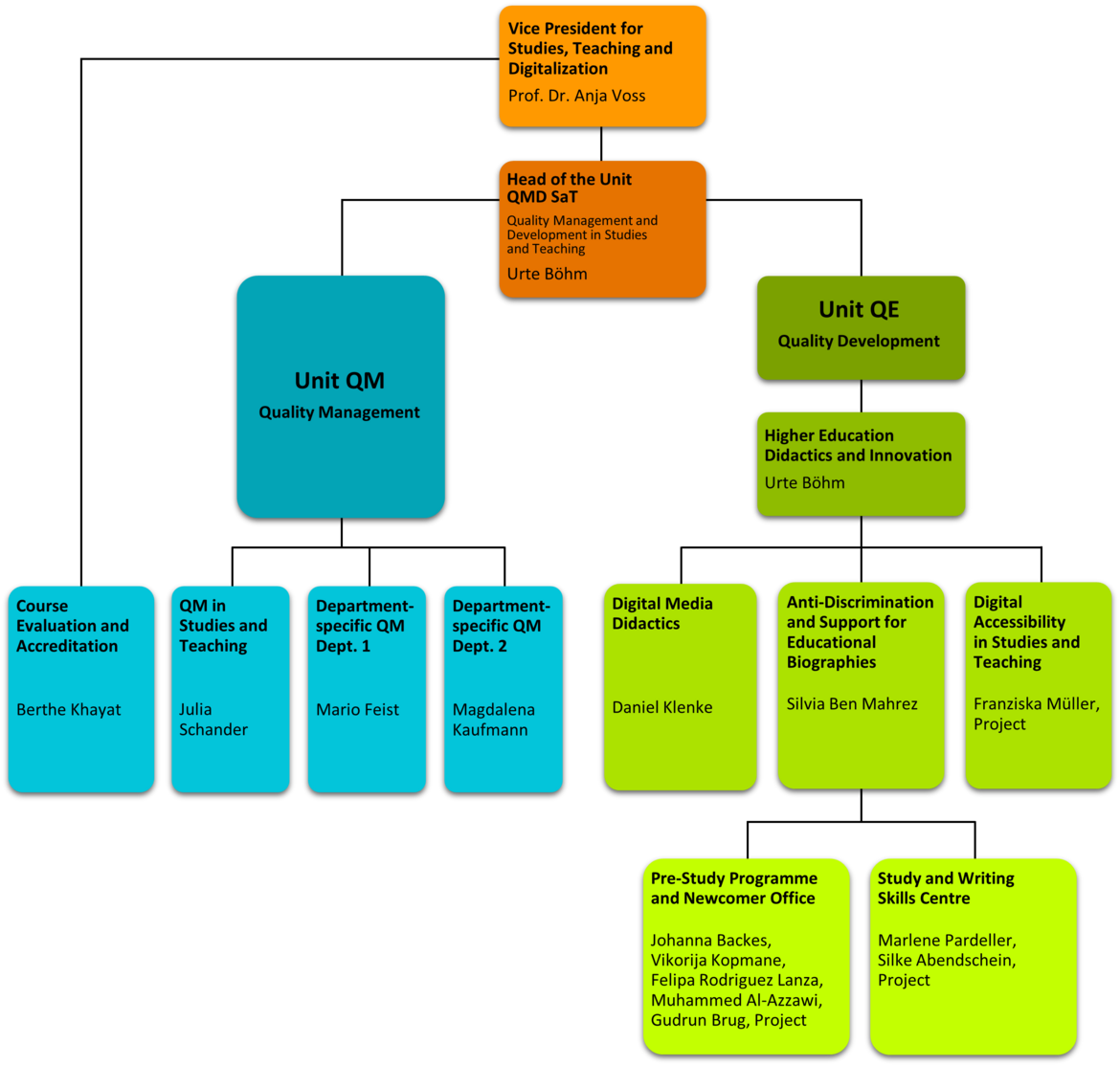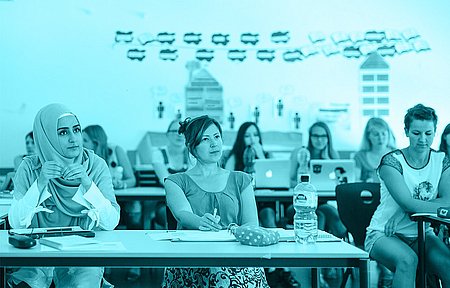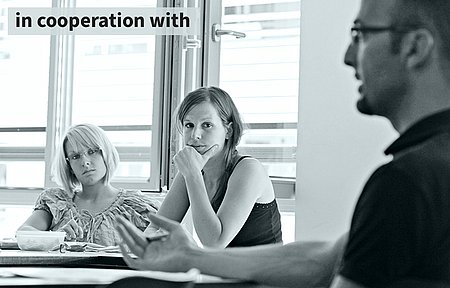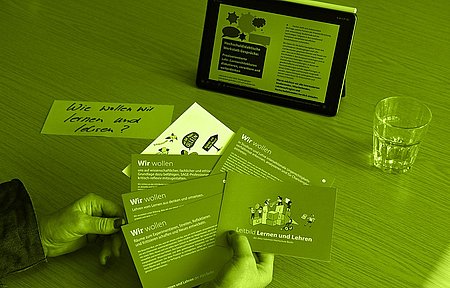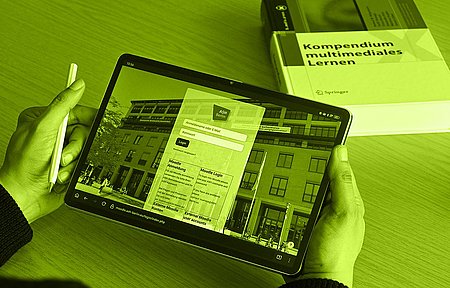Latest news
Here you can find information about current initiatives, projects as well as events from our various areas of work.
Please feel free to check back regularly for updates.
Language workshop on Wednesdays from 12 noon to 2 pm with Marlene.
Topics relating to academic work for all students whose first language is not German.
If you have any questions or requests, please write to Marlene: pardeller@ ash-berlin.eu
Online writing workshop on Wednesdays 10 am - 2 pm with Antea.
From 2 June, the online writing workshop will take place on Mondays 10 am - 2 pm
Registration: bachelortutorium@ ash-berlin.eu
Online bachelor tutorial every two weeks with Antea and Mahssa.
Registration: bachelortutorium@ ash-berlin.eu
Online text feedback with Mahssa.
Contact: textfeedback@ ash-berlin.eu
Individual writing counselling with Marlene.
Registration: pardeller@ ash-berlin.eu
Alice Salomon Hochschule offers various programmes to support international newcomers in their studies and in starting a career in Germany. These offers range from counselling, support and empowerment to language and specialist courses, skills-oriented workshops and networking events.
Click through the offers and forward them to anyone who might be interested!
Silvia Ben Mahrez and Franziska Müller from the Quality Management and Development in Studies and Teaching (QMD SaT) are involved in the university's Internal Organisational Development Process (IOEP) Diversity and support the process with their expertise in the areas of anti-racism and anti-ableism.
As head of the department for opening up the university to discrimination and promoting educational biographies, Silvia brings many years of experience from the ASH Pre-Study Programme and Newcomer Office as well as from the Service Centre for Writing and Study Skills. The focus is on communicating the perspectives of international and refugee students and those interested in studying as part of the organisational culture working group.
As an expert in (digital) accessibility and as a representative for severely disabled employees, Franziska is particularly committed to the disability-critical perspective and represents this in the development of the diversity strategy, among other things.
Urte Böhm and Franziska Müller have developed a comprehensive concept for a flexible, diversity-oriented and inclusive learning architecture for seminar rooms and self-study spaces in the new extension building at ASH Berlin.
Learn more about Learning Architecture (Page opens in new window, German language)
About Us
Our Vision: Quality Drives and Connects ASH
We view the university as a learning organisation and are committed to establishing a sustainable quality culture in studies and teaching. Various stakeholders are involved in this process at both central and decentralised levels. Quality cycles in studies and teaching are implemented in line with the Plan–Do–Check–Act (PDCA) model and play a vital role in ensuring and enhancing academic quality.
We contribute to shaping the profile of Alice Salomon University of Applied Sciences in the areas of studies and teaching by embedding a university-wide culture of quality that aligns with both strategic and operational objectives.
Degree programmes should be manageable and fit for purpose. The relevance of course offerings should be ensured and, where needed, improved. For us, excellent teaching is practice-oriented, research-informed, interdisciplinary, international, and methodologically diverse.
The following strategic goals guide the work of QMD SaT:
- Aligning activities with the university’s mission and strategic direction
- Fostering future-oriented quality development in studies and teaching
- Focusing on student-centred learning and increasing student involvement
- Designing studies and teaching to be diversity-sensitive and inclusive
- Shaping teaching and learning collaboratively at both central and decentralised levels
- Recognising the university as a learning educational organisation
- Managing quality at three levels: 1. teaching and learning practices, 2. curricula, and 3. organisational structures and cultures
The unit Quality Management and Development in Studies and Teaching (QMD SaT) comprises both central and department-specific areas of responsibility. It is centrally based within the Office of the Vice President for Teaching, Learning and Digitalisation, and includes the following two key areas:
- Quality Management in Studies and Teaching (QMD SaT), including department-specific QM for Departments 1 and 2
- Quality Development in Studies and Teaching (QMD SaT), covering higher education didactics and innovation, digital media didactics, digital accessibility, and anti-discrimination work including support for educational biographies
We advise and support departments, study programmes, teaching staff and students, and develop and coordinate quality assurance and development measures in studies and teaching.
We act as service providers, initiators, and enablers of strategic and participative quality development in a future-oriented and operationally effective way.
We are committed to improving access and equity in education and to enhancing student engagement in shaping teaching, learning and the university itself.
We collaborate across the university and participate in national and international communities of practice and professional networks, drawing on current discourse and contributing to the advancement of the field.
Central and decentralised structures are interlinked in order to develop a cohesive quality culture. The aim is to create the greatest possible benefit for study programmes, departments, and the university as a whole.
As part of the development of QMD SaT, appropriate structures are being established in consultation with the deans, the Vice President for Teaching, Learning and Digitalisation, and the Head of QMD TaL. These structures ensure that stakeholders are engaged according to their respective roles and responsibilities.
A monthly jour fixe is held between the deaneries, the Vice President and the Head of the Unit.
Positioning within Integrated Quality Management (IQM)
In collaboration with the Process and Quality Management (PQM) unit, the Department of Quality Management and Development in Studies and Teaching (QMD SaT) is helping to establish an integrated quality management system.
We are united by the aim of developing a shared quality culture that ensures and enhances academic quality in the long term. Both PQM and QMD SaT work systematically, based on clear procedures and service-oriented principles. Together with members of ASH Berlin, we provide tailored solutions, foster exchange, and promote innovation.
Documents
Here you will find guiding principles, framework specifications and recommendations for QMD TaL:
- ASH Berlin (2009): University Mission Statement of ASH Berlin.
University Mission Statement on the ASH Berlin website (09.02.2024) - ASH Berlin (2023): Mission Statement of Learning and Teaching. An Orientation Framework for Quality Development in Studies and Teaching at Alice Salomon University of Applied Sciences Berlin.
Mission Statement of Learning and Teaching as accessible PDF file in English language (30.01.2025)
- Berlin Higher Education Act (amended 10 July 2024).
Berlin Higher Education Act on the website of Berlin in German language (30.01.2025) - EHEA (1999): Bologna Declaration.
Bologna Declaration as PDF file in German language (30.01.2025) - EHEA (2024): Tirana Communiqué.
Tirana Communiqué as PDF file in English language (30.01.2025) - Framework Act for Higher Education.
Framework Act for Higher Education on the website Laws on the Internet in German language (30.01.2025) - HRK (2015): Standards and Guidelines for Quality Assurance in the European Higher Education Area (ESG).
Standards and Guidelines for Quality Assurance in the European Higher Education Area (ESG) as PDF file in German and English language (30.01.2025) - Model Ordinance in accordance with Article 4 (1 - 4) of the Interstate Treaty on Study Accreditation.
Model Ordinance in accordane with Article 4 (1) - (4) of the Interstate Treaty on Study Accreditation as PDF file in German language (28.01.2025) - Berlin Study Accreditation Ordinance (BlnStudAkkV), incl. explanatory memorandum from 16 September 2019
Berlin Study Accreditation Ordinance as PDF file in German language (28.01.2025)
- German Council of Science and Humanities (2017): Strategies for University Teaching - Position Paper.
Strategies for University Teaching - Position Paper as PDF file in German language (09.02.2024) - German Council of Science and Humanities (2012): Recommendations on Accreditation as an Instrument of Quality Assurance.
Recommendations on Accreditation as an Instrument of Quality Assurance as PDF file in German language (30.01.2025) - German Council of Science and Humanities (2022a): Recommendations for a Sustainable Organization of Studies and Teaching.
Recommendations for a Sustainable Organization of Studies and Teaching as PDF file in German language (09.02.2024) - German Council of Science and Humanities (2022b): Recommendations on Digitalization in Learning and Studies.
Recommendations on Digitalization in Learning and Studies as PDF file in German language (31.01.2025)
- DGQ (2015): Quality Management for Universities - A Practical Handbook. 1st ed., Hanser, Frankfurt a.M.
- Nickel, S. (2014): Implementation of Quality Management Systems: Experiences from University Practice. CHE Working Paper No. 163 / May 2014.
Implementation of Quality Management Systems: Experiences from University Practice as PDF file in German language (30.01.2025)
Urte Böhm
Head of the Department of Quality Management and Development in Studies and Teaching
Consultant for Higher Education Didactics and Innovation
Room No. 107
Pronouns: she/her
Working Days: Monday - Friday
Appointments by Arrangement
Franziska Müller
Consultant for Digital Accessibility in Studies and Teaching
Room No. 413
Pronouns: she/her
Working Days: Mon-Fri
Dr. Christoph Balzar
Referent für Digitale Mediendidaktik
Room No. 423
Arbeitstage: Montag - Freitag
Termine gerne nach Vereinbarung
Julia Schander
Referentin für Qualitätsmanagement in Studium und Lehre
Room No. 107
Arbeitstage: Montag - Freitag
Termine gerne nach Vereinbarung
Mario Feist
Qualitätsmanagement in Studium und Lehre / Fachbereich I
Room No. 507
Pronomen: er/ihm
Arbeitstage: Montag - Freitag
Termine gern nach Vereinbarung
Magdalena Kaufmann
Qualitätsmanagement in Studium und Lehre
Fachbereich II
Room No. 310
Pronomen: sie/ihr
Arbeitstage: Montag - Freitag
Termine gerne nach Vereinbarung


